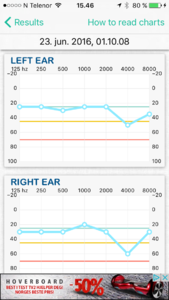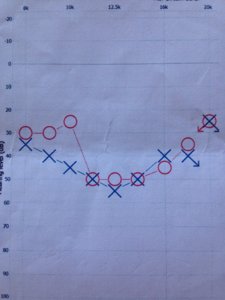Are all tests between 250Hz - 8 kHz they said that was a full hearing assessment?
I wonder how Frequency could help me, tinnitus with no loss??
250 Hz-8 kHz, full hearing assessment? NO WAY! It only covers half of our hearing spectrum and may I add it covers the least important spectrum regarding T.
Now, we know that HL at 4kHz is very common, and most of us will have a "dip" there. But, in my humble opinion, 90% of the time, when people complain about their T they will describe it as a high pitch hiss/noise.(me included). The higher range is most vulnerable to noise damage, simply bc its closest to our middle ear where the "stirrup" bone hammers on our cochlea. Thus, only covering the lowest frequencies is the biggest misunderstanding among audiologists when it comes to cover the culprit of your T.
The lower half cover most of our day to day input of sounds, yes, like speech, thus makes it more important to audiologists regarding HL. But in accounts to T, it often doesn´t say shit!
I would encourage all of you out there, who think you have normal hearing, to take a hearing test ranging from 8 kHz- 16 kHz. It will probably tell a different story.
My first audiologist, when I demanded to measure the higher end, she reluctantly complied, bc she did not understand what I was going to use it for. Actually she repeated that again and again

I´ll post my two audiograms to show what I mean(the first not by professionals though):


Apart from the "usual" dip at 4kHz I have very good hearing, at lower frequencies, as you can see. I guess, in a way, I´m lucky bc the audiogram to the right quite literally explain my unilateral high frequency T. You see the violent "dip" there. Ouch! The brain has to compensate for that, dose it not?

My T is definitely in that area.
Even though I have even worse HL in my left ear, it´s more "smooth" and the brain does not care. No real gaps to fill. I have speculated about what if I could just self inflict some more damage to my HC exactly at 10kHz in my right ear, making it more like the left one? Would that do the trick?
So this is, at least, is my understanding on the matter.
Still, this tells us nothing about wether my damage is in my IHC, OHC or synapses, which leads me to the question, FTX vs. Decibel!
Personally, I believe that our HC, to some degree, actually has the ability to regenerate by themselves(contrary to science, I know). I have had some traumas over the years, where T would generate, staying for a few months, and then slowly vanish again. To me that is not good news according to the treatment FTX has to offer as I may be depleted of my dormant/progenitor cells already. This can of course be an effect of the brain not finding the damage I had, until my latest trauma, to be enough to compensate for in the long run. Sadly, I don´t have any earlier audiograms to compare with.
There are many variables here, I know. The nature of the damage, trigger mechanisms, brain chemistry, psychological awareness etc..
Still, FTX approach is pretty ingenious, is it not? Still, I have some questions
Activating preprogrammed cells, to divide and regenerate, who knows its place and function. But can we be sure they will generate a synaptic connection to the hearing-nerve? Has this been established?
I have read that OHC is not as easy to regenerate, is there any scientific reason for this?
Also, lets say one only has synaptopathy, but the HC itself is alive and kicking.
Firstly, is this even possible? Would´nt you think that when the synapses are retracting from the cell it would be of no use to the brain and die? Can it be like with our teeth, when the nerves connected to it dies, the tooth would too? Maybe this is not the case anyway

.
Can the synapses bee seen as a root, nourishing the associated HC? And when they retracts the HC will die as well?
Is it possible that FTX´s drug will pinpoint synaptopathy and replace it with a new HC or will the HC in it self have tobe dead and gone for it to program a new one?
Seems like maybe the the golden bullet, as some have mentioned, would be to eventually have both treatments. Question is then what is likely most profitable to have first? Would one have a diminishing effect of the other?
I can´t wait to see how this will pan out, this is too interesting, and worth living for

To me, its a question of trying to hold back on the benzo as much as I can, until they stick a needle into my ear!

Thanks for reading, obviously I had a lot on my mind!

 Member
Member


 My T is definitely in that area.
My T is definitely in that area. .
.
